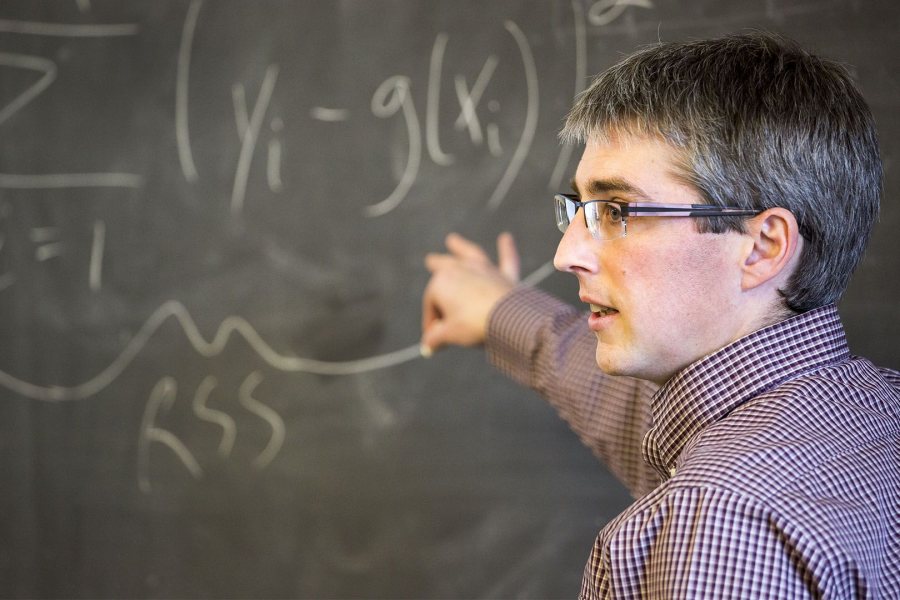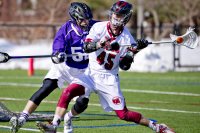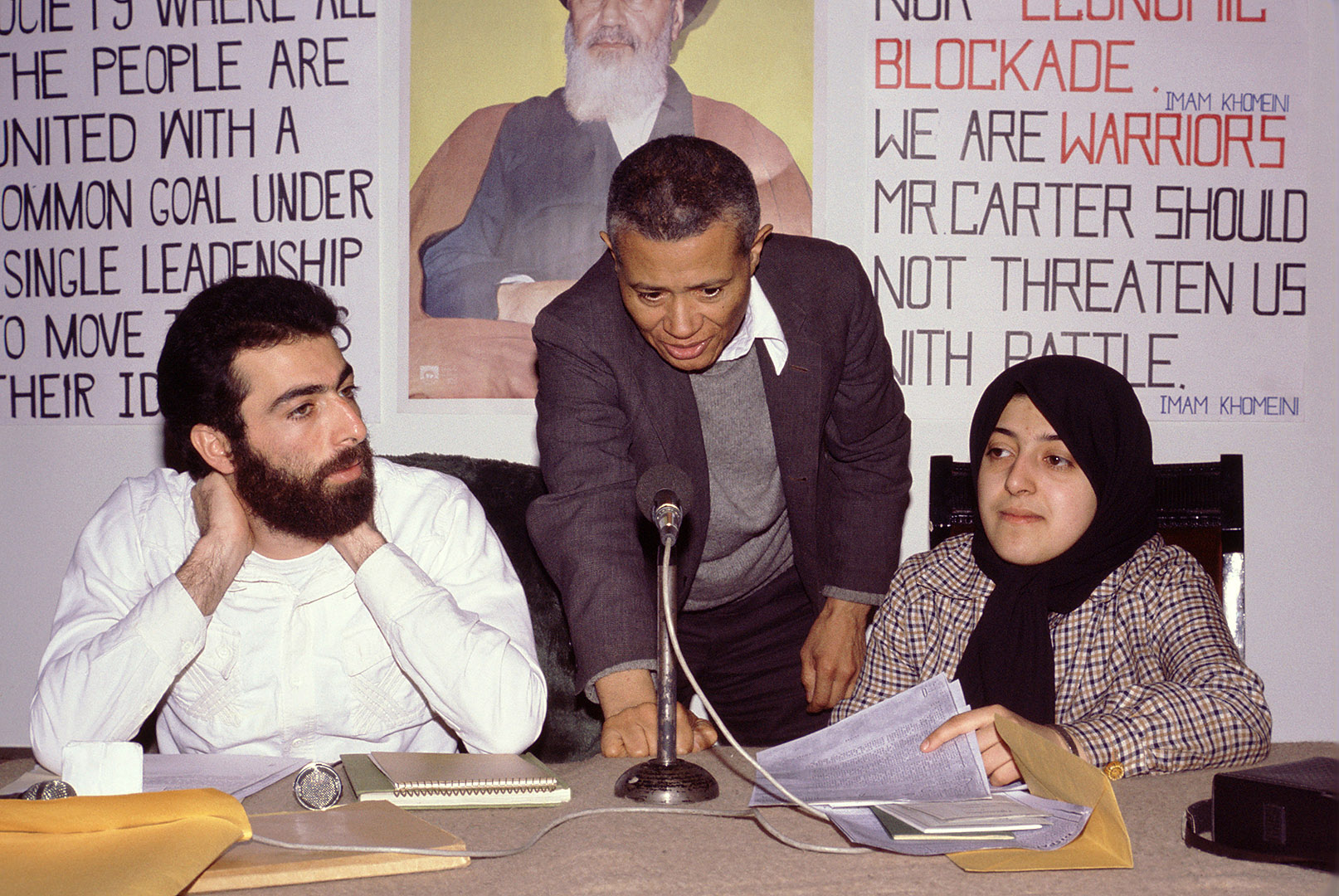
Bates in the News: Dec. 14, 2018
Elizabeth Rynecki ’91
A crusade to recover Jewish art lost during the Holocaust — Haaretz
The Israeli newspaper Haaretz interviewed Elizabeth Rynecki ’91 ahead of the premiere in Jerusalem of a documentary about Rynecki’s quest to track down the many lost paintings of her great-grandfather, a Polish artist who died in the Holocaust.
“My great-grandfather’s paintings were survivors…with no voice,” she said.
Moshe Rynecki, who lived in Warsaw, was able to hide some 800 of his paintings before the war. Though members of his family survived, including his wife, only a fraction of his paintings have been recovered.
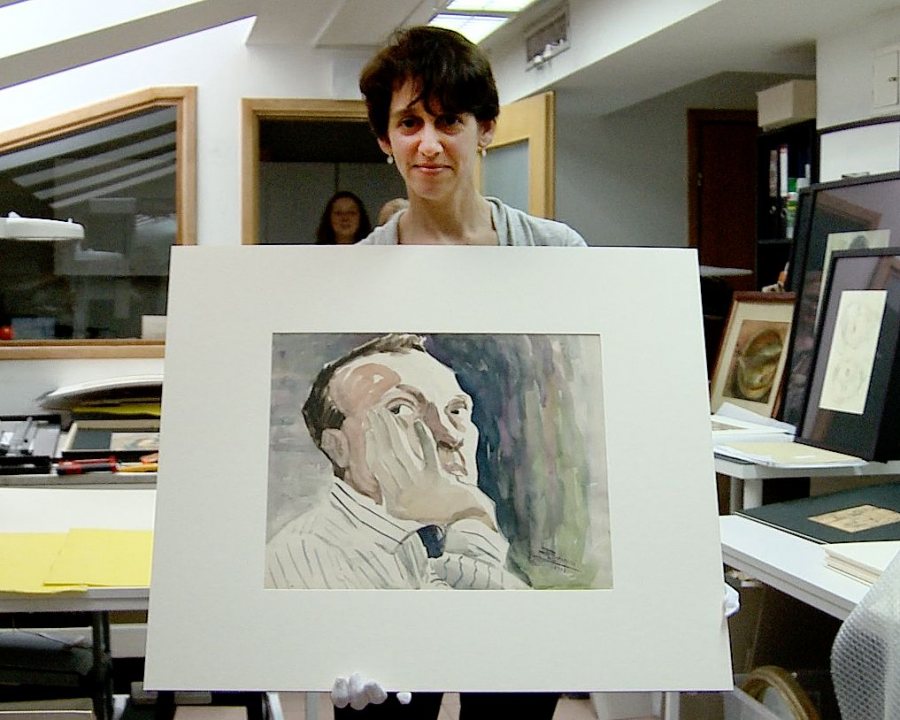
Elizabeth Rynecki ’91 holds her great-grandfather’s self-portrait at the Jewish Historical Institute in Warsaw. (Photograph by Sławomir Grünberg)
Attracting widespread media attention, Elizabeth’s efforts to recover more of her great-grandfather’s paintings include a database of his works and the book Chasing Portraits: A Great-Granddaughter’s Quest for Her Lost Art Legacy.
The paintings “are a powerful reflection of life in Poland before the war that not many people are aware of,” she said. “I felt that I could rescue that legacy and share it with the world.”
- Read the story: “A crusade to recover Jewish art lost during the Holocaust,” Haaretz, Nov. 25, 2018
- Related: “A ‘moral imperative’ to recover a lost art legacy,” New York Times, Aug. 18, 2016
Edmund Muskie ’36
Muskie’s 1968 vice presidential campaign recalled at Bates College forum — Sun Journal
Steve Collins of the Lewiston Sun Journal covered a Bates panel celebrating the 1968 vice presidential campaign of U.S. Sen. Edmund Muskie ’36, featuring experts and people who had worked with Muskie on the campaign trail.
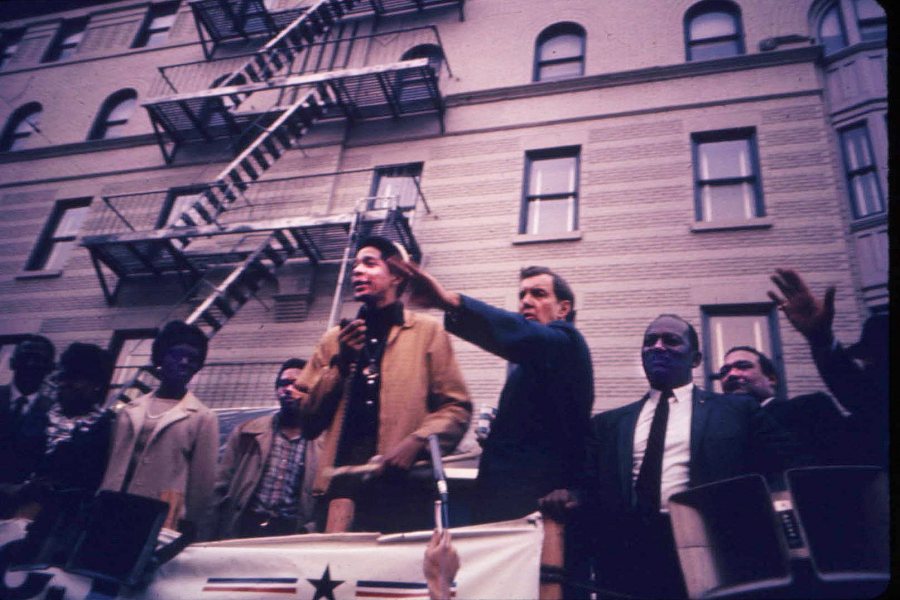
Edmund Muskie ’36 and supporters at a 1968 campaign event. The location is perhaps New York City; third from left is perhaps Shirley Chisholm, then running for her first term as a Congresswoman. (Burton Burinsky / Muskie Archives and Special Collections Library)
The panelists described a politician who worked to bridge divides and calm clashes, “reaching out to both sides,” said Charles Micoleau, a campaign staffer and later Muskie’s chief of staff.
Hubert Humphrey and Muskie lost the ’68 race to Richard Nixon by less than 1 percent, and Muskie lost his own bid for the presidency in the 1972 Democratic primary. But his high profile and prestige was “a real driving force, a hammer pounding the Clean Air Act through the committee and the Senate” in 1970, said Eliot Cutler, who was Muskie’s assistant press secretary.
“We are the lucky ones who are still here,” Cutler said. Muskie’s role in the history of the 20th century “shaped all of us.”
- Read the story: “Muskie’s 1968 vice presidential campaign recalled at Bates College forum,” Lewiston Sun Journal, Nov. 29, 2018.
- Related: “8 reasons why Edmund Muskie ’36 was an amazing political candidate in 1968,” Bates News, Dec. 5, 2018
Rebecca Herzig
To shave, or not to shave? How a new generation of women are embracing body hair — Vogue
Women are taking an increasingly laissez-faire approach to body hair, wrote Maya Singer of Vogue. For a historical perspective on women and shaving, she turned to Professor of Gender and Sexuality Studies Rebecca Herzig, author of Plucked: A History of Hair Removal.
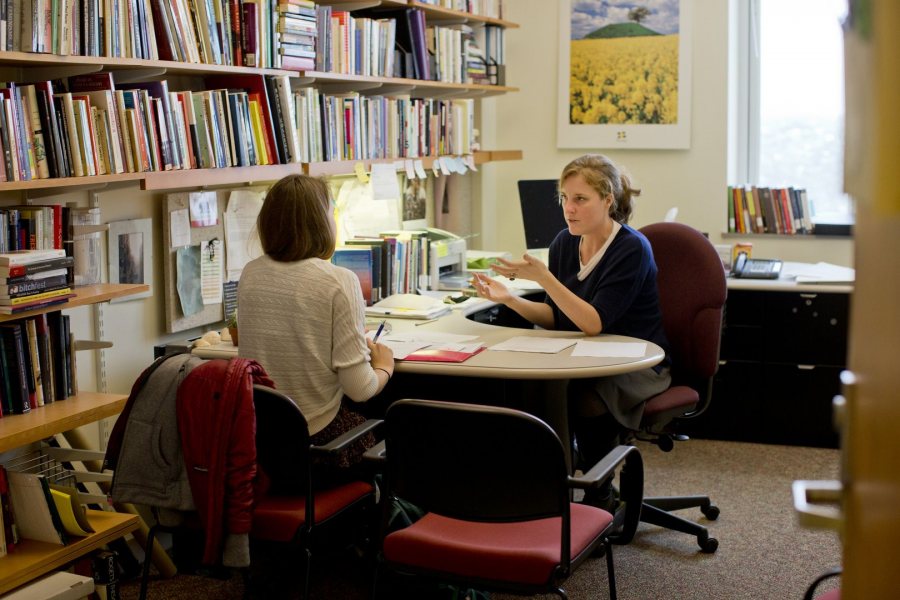
Professor of Gender and Sexuality Studies Rebecca Herzig discusses a field project with a student in 2016. (Phyllis Graber Jensen/Bates College)
Hairlessness didn’t become a beauty standard until after WWII, Herzig wrote in Plucked. Some second-wave feminists in the 1970s revolted against this standard by condemning shaving entirely, whereas the early 2000s were given to the “Brazilian wax tyranny,” Singer wrote.
Singer characterizes the present age as one of, “I’ll shave if I want to,” and razor companies are taking notice.
“One way to characterize what we’re seeing may be that women are now encouraged to ask—and increasingly expect—brands to fulfill their needs,” Herzig said.
- Read the story: “To shave, or not to shave? how a new generation of women are embracing body hair,” Vogue, Dec. 10, 2018
- Related: “‘Plucked’: Race, gender, science, medicine converge in history of hair removal,” Bates News, Feb. 4, 2015
Rebecca Fraser-Thill
Should you go back to work for your old company? — MarketWatch
For a list of factors to keep in mind if you’re thinking about returning to a previous workplace, MarketWatch writer Meera Jagannathan turned to Lecturer in Psychology Rebecca Fraser-Thill, a Pivot career coach.
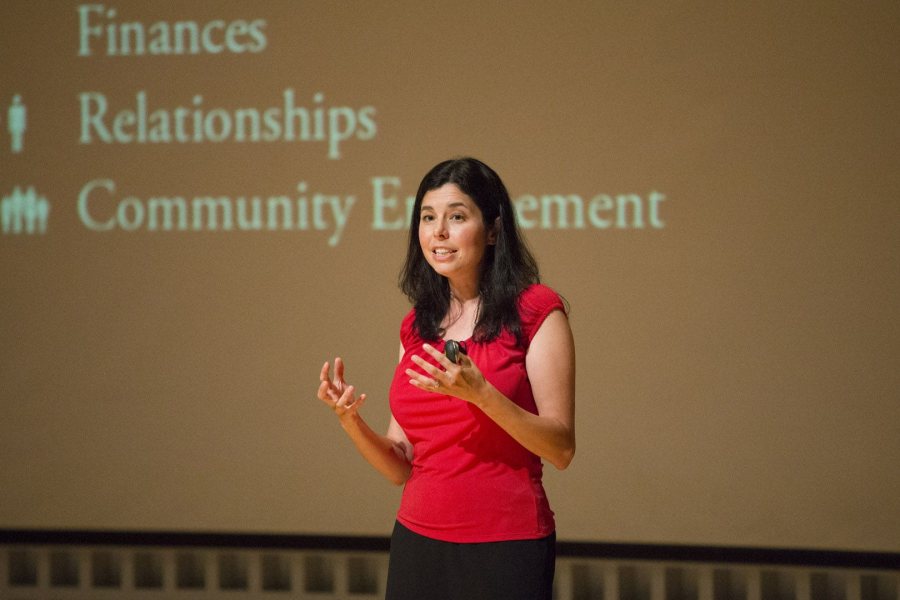
Lecturer in Psychology Rebecca Fraser-Thill speaks about Bates’ Purposeful Work initiative at the 2016 new student Orientation. (Phyllis Graber Jensen/Bates College)
Fraser-Thill recommended asking friends and family what you were like at your old job, thinking about the relationship you had with your old boss, comparing your current workplace to your old workplace, and — if you decide to make the move back — framing the decision positively.
“You’ve taken a moment to really consider your path, and you are intentionally and actively choosing this former employer,” she told Jagannathan.
- Read the story: “Should you go back to work for your old company?” MarketWatch, Oct. 15, 2018
Nathan Tefft
‘It’s Just Math’ — Mainers recreate ranked-choice voting results to test the process — Maine Public
When some argued that Maine’s new ranked-choice voting process is an inaccessable “black box,” Associate Professor of Economics Nathan Tefft replicated the election results on his own and sent his calculations to Maine Public.
Using publicly available voting data and a common open-source programming language, Tefft exactly replicated the results of the election, which used the innovative ranked-choice format for the first time to proclaim Jared Golden ’11 the winner. (Another Mainer did the same using Microsoft Excel.)
“It’s an important idea for me to support trust and confidence in the vote counting process,” Tefft told reporter Steve Mistler. “So I certainly wanted it to be as transparent as possible.”
- Read the story: “‘It’s Just Math’ — Mainers recreate ranked-choice voting results to test the process,” Maine Public, Dec. 2, 2018
Vicki Losick ’01
MDI researcher will use fruit flies to study macular degeneration — Bangor Daily News
The Bangor Daily News covered Vicki Losick ’01, a researcher at the MDI Biological Institute who received a $50,000 grant to use fruit flies to study age-related eye diseases.
The grant, awarded by the William Procter Scientific Innovation Fund, will allow Losick to model the “cellular dysfunction” that occurs in age-related macular degeneration, among other causes of blindness. She’ll use fruit flies in her work, since macular degeneration takes hold more quickly due to the creatures’ shorter lifespans.
“With the aging of the population, age-related macular degeneration is increasingly being viewed as an impending epidemic,” Losick said in a press release. “I am deeply grateful to the Procter Fund for supporting research that could lead to the identification of the genetic and cellular causes underlying retinal dysfunction.”
- Read the story: “MDI researcher will use fruit flies to study macular degeneration,” Bangor Daily News, Nov. 30, 2018
Lisa Utzschneider ’90
Lisa Utzschneider becomes CEO of ad-verification firm — Variety
Bates alumna and trustee Lisa Utzschneider ’90 has been named CEO of Integral Ad Science, a company that measures the value of digital advertisements and helps prevent fraud, the entertainment trade magazine Variety reported.
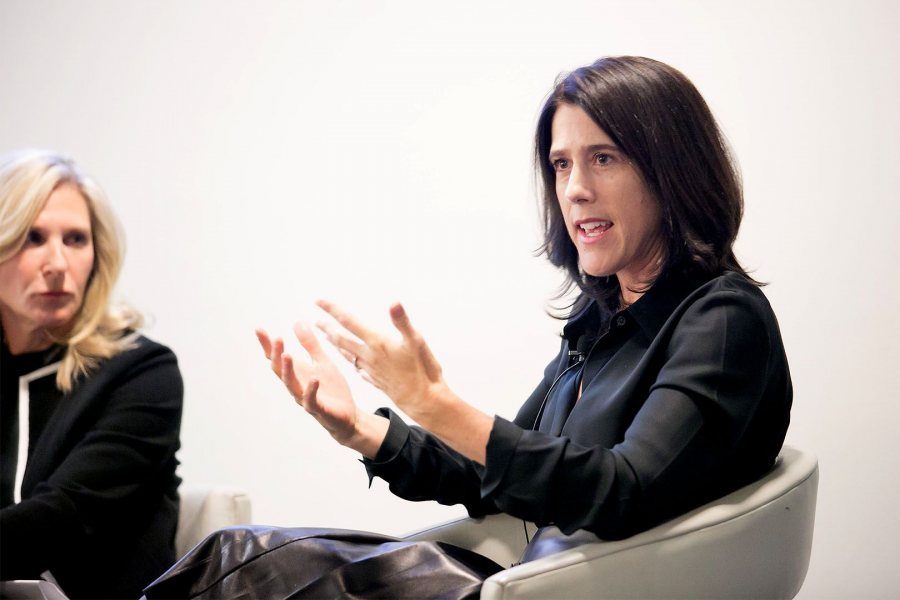
Lisa Utzschneider ’90 speaks during a Bates Boston Business Network panel on women in leadership in 2017. (Paige Brown ’96 for Bates College)
Utzschneider was most recently chief revenue officer at Yahoo and has held executive roles at Microsoft and Amazon. Last year, she was on a Bates panel about women and leadership.
“As CEO, Utzschneider will focus on expanding IAS into new global markets and pushing into new ad formats, including over-the-top video and audio,” according to Variety.
- Read the story: “Lisa Utzschneider becomes CEO of ad-verification firm,” Variety, Dec. 12, 2018
- Related: “To be an effective leader, be prepared, speak up, and aim big, Bates panelists say,” Bates News, Oct. 5, 2017
Martin Benes ’07
Wednesday Workout: hitting the trails with U.S. Para-Nordic and Head Coach Martin Benes — FasterSkier
Writer Gabby Naranja reached out to Martin Benes ’07, who recently joined the coaching staff of U.S. Paralympics Nordic skiing. U.S. Paralympics is a division of the U.S. Olympic Committee
An assistant ski coach at Bates from 2009 to 2011 and most recently the Nordic ski director at Sugar Bowl Academy, Benes told Naranja that the coaching philosophy for a para-athlete is the same as for a non-disabled athlete.
“The training principles don’t really change,” Benes said. “Yes, there are things to be aware of physiologically, but in terms of the core principles, it’s not that different.”
“With this level of athlete,” he added, “you’re helping guide them and giving them the framework to be successful and helping them be their own best coaches.”
- Read the story: “Wednesday Workout: hitting the trails with U.S. Para-Nordic and Head Coach Martin Benes,” FasterSkier, Dec. 5, 2018
Larry DiGiammarino ’82
Catching up with…Larry DiGiammarino — The Boston Globe
The Globe’s Marvin Pave chatted with Larry DiGiammarino ’82, who holds or shares Bates football records for career and single-game receptions, as well as career and single-game touchdown receptions. He was named a Kodak Little All-American, the ECAC and New England Football Writers Player of the Year, and a Scholar Athlete of the Year by the Maine Sports Hall of Fame.
Now, DiGiammarino is a real-estate attorney in Marblehead, Mass., where he’s on the school committee and the youth football and softball boards.
“I learned through sports to never give up and stay as positive as I can,’’ he told Pave. “If things don’t work out today, there’s always tomorrow.”
- Read the story: “Catching up with … Larry DiGiammarino,” The Boston Globe, Nov. 29, 2018
Kristy Andrews ’12
Young camp professionals: choosing careers in Maine, fulfilling commitments to kids — Bangor Daily News
In the Bangor Daily News blog Summer in Maine, Kristine Millard talked to Kristy Andrews ’12, assistant director of Camp Wawenock in Raymond, Maine.
Andrews spent her childhood summers at Camp Wawenock and later became a counselor, working there before and after a stint as an English teacher in Chile. Now, she’s one of a few year-round employees at the camp.
Andrews spoke to the community the camp offers girls, allowing them to “be their true selves.”
“There’s a whole group of people who love you and support you,” she said.
- Read the story: “Young camp professionals: choosing careers in Maine, fulfilling commitments to kids,” Bangor Daily News, Nov. 13, 2018
Paul Erickson ’74
Don’t Mess With Me: The Strange Lives of Venomous Sea Creatures — Kirkus Reviews
Kirkus reviewed the latest book for middle grades by Paul Erickson ’74: Don’t Mess With Me, which catalogs 28 venomous sea creatures from the deadly blue-ringed octopus to sea jellies.
“He goes on, now following the phylum order, to introduce a variety of other sea creatures including bloodworms, the blind remipede (the first known venomous crustacean), the crown of thorns sea star, the bluespotted stingray, the reef stonefish, and the lionfish,” the review says.
“Though the text in this entry in an admirable series may be challenging for young readers, the subject has guaranteed kid appeal,” it added.
- Read the review: “Don’t Mess With Me: The Strange Lives of Venomous Sea Creatures,” Kirkus Reviews, Dec. 4, 2018
